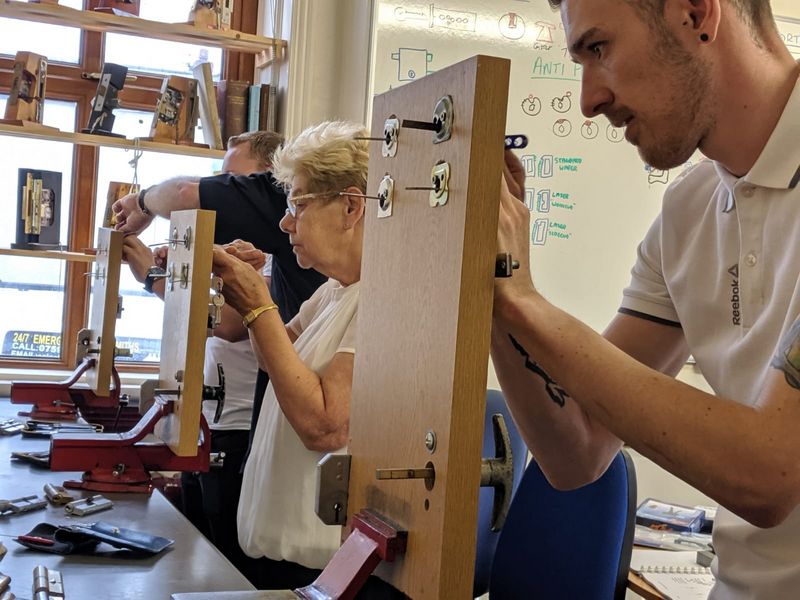
What qualifications do I need to be a locksmith?
Becoming a locksmith requires a unique set of skills and specialization in the field. A locksmith is responsible for assisting people in various lock and key-related issues, such as repairing, installing, and unlocking locks. To excel in this profession, it is essential to possess a combination of experience, qualifications, certification, and knowledge.
To start a career as a locksmith, having the right qualifications is crucial. This profession often requires individuals to complete a locksmith training program or apprenticeship. These programs provide comprehensive education in key areas such as key cutting, lock installation, and lock maintenance. By gaining the necessary training, aspiring locksmiths can develop the foundational knowledge and skills required to excel in the field.
In addition to formal training, certification is also an important aspect of becoming a locksmith. Many locksmith organizations and associations offer certification programs to validate an individual’s expertise and credibility. Obtaining certification demonstrates a locksmith’s commitment to continuous learning and staying updated with the latest industry standards. It also enhances their professional reputation and increases their chances of finding employment or starting their own locksmith business.
Furthermore, a strong background in experience is highly beneficial for a locksmith. Practical experience helps locksmiths familiarize themselves with different types of locks and their unique mechanisms. It enables them to efficiently handle various lock-related issues and provide effective solutions to clients. While formal education provides the necessary knowledge, practical experience allows locksmiths to apply that knowledge in real-life scenarios.
In summary, to become a successful locksmith, a combination of skills, specialization, experience, qualifications, certification, and knowledge is vital. By obtaining the right training and credentials, aspiring locksmiths can develop the necessary expertise to excel in this profession and provide efficient and reliable services to their clients.
What qualifications do I need to be a locksmith?
When pursuing a career as a locksmith, there are several key qualifications to consider. First and foremost, many regions require locksmiths to be licensed in order to practice legally. Obtaining a license typically involves completing specific training programs and passing an exam to demonstrate proficiency in the field.
In addition to being licensed, locksmiths can also benefit from obtaining certification. Certification serves as a way to showcase one’s expertise and commitment to professional standards. While certification is not always mandatory, it can greatly enhance a locksmith’s credibility and open up more opportunities for specialization.
While a basic level of certification can be sufficient for many locksmiths, those who wish to specialize in certain areas may require further qualifications. For example, locksmiths who want to work on high-security systems or electronic locks may need additional training and certification specific to those areas.
Experience is another important aspect of becoming a successful locksmith. By gaining practical experience in the field, locksmiths can develop their skills and knowledge. This can be achieved through apprenticeships, internships, or working alongside experienced locksmiths. Many locksmiths also choose to join professional organizations to network with others in the industry and gain valuable insights.
In summary, the essential qualifications for becoming a locksmith include being licensed, obtaining certification, having specialized knowledge, and gaining practical experience. By meeting these qualifications, locksmiths can establish themselves as trusted professionals in their field.
Essential skills and training
To become a licensed locksmith, there are essential skills and qualifications you need to acquire. Firstly, you need to have a comprehensive knowledge of the locksmith industry. This includes understanding different types of locks and security systems, as well as their installation and repair methods.
Additionally, you should possess strong problem-solving and analytical skills, as locksmiths often encounter complex lock and key issues that require quick thinking and efficient solutions. Attention to detail is also crucial, as even the smallest mistake can compromise the security of a lock.
Experience also plays a significant role in becoming a successful locksmith. The more hands-on experience you have in dealing with various locks and security systems, the better equipped you will be to handle different situations. This experience can be gained through apprenticeships or working under the guidance of an experienced locksmith.
Furthermore, locksmiths may choose to specialize in specific areas such as residential, commercial, or automotive locksmithing. Specialization allows locksmiths to focus their skills and provide tailored services to their clients.
Finally, proper training is essential for a locksmith. Many technical colleges and vocational schools offer locksmith training programs that cover topics such as key cutting, lock installation, and security system maintenance. These programs provide both theoretical knowledge and practical hands-on experience to prepare individuals for a career in locksmithing.
In conclusion, to be a successful locksmith, you need to acquire the necessary knowledge, skills, qualifications, and training. A combination of technical expertise, problem-solving abilities, experience, and specialization will allow you to excel in this field and provide quality locksmith services to your customers.
Basic locksmith qualifications
In order to become a locksmith, certain qualifications and skills are required. Here are the basic locksmith qualifications:
- Knowledge: A locksmith should have a solid understanding of lock systems, keys, and security mechanisms. This includes knowledge of different types of locks, such as padlocks, deadbolts, and electronic locks.
- Licensed: Most jurisdictions require locksmiths to be licensed. Licensing ensures that locksmiths have met certain standards of training and professionalism.
- Qualifications: While specific qualifications may vary depending on the jurisdiction, locksmiths typically need to complete a recognized locksmith training program or apprenticeship.
- Training: Locksmiths often receive formal training through vocational schools, community colleges, or locksmith associations. Training programs cover topics such as key cutting, lock installation, lock picking, and safe servicing.
- Experience: While not always a requirement, having practical experience working with locks and security systems can greatly enhance a locksmith’s skills and credibility.
- Skills: Locksmiths need to possess a range of skills, including manual dexterity, problem-solving abilities, attention to detail, and good customer service skills. They must also be able to work independently and handle emergency situations.
- Certification: Some locksmiths may choose to obtain optional certifications to demonstrate their expertise and commitment to the profession. Certifications, such as those offered by the Associated Locksmiths of America (ALOA), can enhance a locksmith’s professional reputation.
By fulfilling these basic locksmith qualifications, individuals can enter the locksmith profession and provide valuable services in the field of security and lock systems.
Advanced locksmith qualifications
Once you have obtained your basic locksmith license and gained some experience in the field, you may choose to pursue advanced qualifications in order to specialize in certain areas of locksmithing. These advanced certifications can help you enhance your skills, expand your knowledge, and improve your career opportunities.
There are several specialized qualifications that you can pursue as a locksmith. These qualifications often require additional training and exams to prove your expertise in specific areas. Some examples include:
– Master Locksmith Certification: This certification demonstrates a high level of expertise and knowledge in various aspects of locksmithing, including advanced lock systems, key cutting, safe installation, and more.
– Automotive Locksmith Certification: This qualification focuses on automotive locksmithing skills, such as key programming, ignition repair, and vehicle lockout techniques.
– Safe Technician Certification: This certification specializes in safe installation, combination changes, and safe cracking techniques.
Obtaining these advanced qualifications can open up new career opportunities and allow you to work on more complex and specialized locksmithing projects. It is important to continue learning and improving your skills in order to excel in the locksmith industry.
Experience as a locksmith
Experience is an essential aspect of becoming a professional locksmith. While some individuals may consider pursuing a career in locksmithing without any prior experience, it is highly recommended to gain practical knowledge and expertise in the field.
In order to become a licensed locksmith, individuals must typically complete a certification program or apprenticeship. These programs provide aspiring locksmiths with the necessary knowledge and skills to succeed in the industry.
During their training, locksmiths learn about various aspects of the trade, including key cutting, lock installation and repair, security systems, and customer service. This comprehensive training equips locksmiths with the specialized knowledge required to handle a wide range of locksmithing tasks.
While formal education and certification are important, having practical experience is equally valuable. Through hands-on experience, locksmiths gain problem-solving skills and learn how to effectively address different lock and security-related issues.
Locksmiths often start their careers by working as apprentices in established locksmith companies. This allows them to learn from experienced professionals in real-world settings. By working alongside experienced locksmiths, apprentices can observe and participate in a wide range of locksmithing tasks and gain valuable insights into the profession.
Additionally, seeking employment at a locksmith company or pursuing freelance opportunities can provide aspiring locksmiths with the chance to further enhance their skills and gain practical experience. Dealing with various lock-related challenges on a day-to-day basis helps locksmiths develop their expertise and problem-solving abilities.
Ultimately, experience as a locksmith is a crucial aspect of one’s qualifications in the locksmithing industry. It not only helps build credibility and trust but also enhances the locksmith’s ability to handle diverse and complex locksmithing tasks effectively.
Knowledge of different lock types
A locksmith’s qualifications should include a thorough knowledge of different lock types. This understanding is necessary in order to effectively install, repair, and maintain various lock mechanisms. Some common lock types that a locksmith should be familiar with include:
- Mechanical locks
- Electronic locks
- Biometric locks
- Combination locks
- Keyless entry systems
- Padlocks
- Deadbolts
- Mortise locks
- Cylinder locks
In addition to understanding the different types of locks, a locksmith should also be knowledgeable about the specific features and functionalities of each type. This includes understanding how to operate, install, and repair the locks, as well as how to troubleshoot and address any issues that may arise. Specialization in certain types of locks, such as automotive locks or high-security locks, may also be beneficial for locksmiths seeking to expand their skills and services.
To gain this knowledge, locksmiths often undergo specialized training programs and certification courses. These programs provide comprehensive instruction on lock types, their components, and the techniques required for their installation and repair. Some locksmiths may also acquire additional experience and skills through apprenticeships or on-the-job training.
Having a solid understanding of different lock types allows locksmiths to effectively meet the needs of their clients, whether it be by installing new locks, repairing damaged locks, or assisting with lockouts. It demonstrates their expertise and provides reassurance to clients that they are working with a qualified and knowledgeable professional.
Locksmith tools and equipment
As a locksmith, having the right tools and equipment is crucial to perform your job efficiently and effectively. Along with the necessary training, qualifications, knowledge, experience, and skills, having the right tools is essential in any locksmith’s work.
The main tools and equipment that a locksmith uses include:
- Key cutting machines: These machines are used to cut and duplicate keys quickly and accurately.
- Lock picks and tension wrenches: These tools are used to manipulate the internal mechanisms of locks and gain entry.
- Key extractors: These tools are used to remove broken or stuck keys from locks.
- Deadbolt installation tools: These tools are used to install and repair deadbolt locks.
- Lock bypass tools: These tools are used to bypass locks without using a key, often in emergency situations.
- Pinning kits: These kits contain various sizes of pins and springs used to rekey locks.
- Car key programming tools: These tools are used to program car keys and remotes.
It is important for a locksmith to be knowledgeable about different types of locks and security systems, as well as the specific tools and equipment required for each job. This knowledge and experience can be gained through proper training and hands-on experience in the field.
In addition to the necessary tools, locksmiths often need to be licensed and certified, depending on the requirements of their jurisdiction. This ensures that they have met certain standards and have the necessary skills to perform their job safely and responsibly.
Some locksmiths also choose to specialize in certain areas of the field, such as automotive locksmithing or safe cracking. This specialization may require additional training, qualifications, and specialized tools and equipment.
In conclusion, having the right tools and equipment is crucial for a locksmith to perform their job effectively. Along with the necessary training, qualifications, knowledge, experience, and skills, locksmiths rely on tools such as key cutting machines, lock picks, key extractors, deadbolt installation tools, lock bypass tools, pinning kits, and car key programming tools. By staying up to date with the latest tools and techniques, locksmiths can provide reliable and professional locksmith services.
Security systems and technology
In addition to the essential qualifications, experience, and knowledge required to be a locksmith, understanding security systems and technology is vital in this profession. As the field of locksmithing evolves, locksmiths need to stay up to date with the latest security systems and technologies.
A locksmith must have in-depth knowledge of different security systems such as alarm systems, CCTV systems, access control systems, and electronic locks. This knowledge is crucial for providing effective locksmith services to clients.
With the advancements in technology, locksmiths must be well-versed in the use of computerized systems and digital devices used in security systems. They need to understand how to install, repair, and maintain these advanced security systems.
Specializing in specific security systems and technologies can be beneficial for locksmiths. This specialization can involve gaining certifications and additional training in areas such as biometric access control systems or electronic security systems.

Being licensed and having the necessary training are essential for locksmiths to work with these security systems and technologies. Locksmiths must comply with regulations and standards to ensure that they provide reliable and secure services to their clients.
Strong problem-solving and critical thinking skills are also crucial in the locksmithing profession, especially in dealing with security system malfunctions or vulnerabilities. Locksmiths must possess these skills to analyze, diagnose, and resolve issues efficiently.
In conclusion, locksmiths need to possess qualifications, experience, and knowledge in locksmithing as well as a good understanding of different security systems and technologies. Continuous learning, training, and specialization in specific areas of security systems can help locksmiths stay relevant and provide effective services in this evolving field.
Customer service skills
In addition to the technical skills and knowledge required to be a locksmith, customer service skills are also essential in this profession. As a locksmith, you will often interact directly with customers, and it is important to provide excellent service and ensure customer satisfaction.
Good communication skills are crucial for locksmiths, as you will need to listen to customers’ needs and clearly explain your services and solutions. Being able to communicate effectively and in a friendly manner will help build trust and reassure customers that you are capable of meeting their locksmithing needs.
Problem-solving and critical thinking skills are also important for locksmiths. You may encounter complex or unique lock and key issues that require creative solutions. Having the ability to assess and analyze a situation quickly, identify the best course of action, and efficiently solve problems is key to providing excellent customer service.
Patience is another important attribute for locksmiths. Some customers may be frustrated or stressed when they contact you, and it is important to remain calm, understanding, and patient. By being empathetic and reassuring, you can help alleviate their concerns and build a positive customer experience.
Lastly, time management skills are crucial for locksmiths to ensure timely service delivery. Being able to prioritize and efficiently handle multiple tasks or service calls is important in meeting customer expectations and maintaining a professional reputation.
While certification, training, experience, and qualifications are essential for becoming a licensed locksmith, developing and honing customer service skills is equally important. By combining technical expertise with excellent customer service, locksmiths can build lasting relationships with their clients and establish a successful career in this field.
Problem-solving abilities
Problem-solving abilities are an essential skill for locksmiths. Locksmiths often encounter complex situations and need to be able to solve problems quickly and effectively. They must have the ability to assess a situation, identify the problem, and come up with a solution.
With the proper certification, qualifications, skills, training, and knowledge, locksmiths are equipped to handle various locksmithing tasks. They are trained to work with different types of locks and security systems, whether it’s a traditional lock or a more advanced electronic system.
Locksmiths may specialize in specific areas such as residential, commercial, or automotive locksmithing. This specialization allows them to develop a deep understanding of the unique challenges and requirements of each area.
It’s important for locksmiths to be licensed and certified to ensure that they have met the necessary standards and regulations in their field. This provides customers with the assurance that they are working with a qualified and trustworthy locksmith.
In addition to technical skills, locksmiths also need strong problem-solving abilities. They need to be able to think analytically, approach problems creatively, and find efficient solutions. They may have to troubleshoot issues with locks, keys, or security systems, and finding the right solution requires critical thinking and problem-solving skills.
Overall, locksmiths must possess not only the necessary technical skills and knowledge but also strong problem-solving abilities in order to excel in their profession and provide effective solutions to their clients.
Business and marketing skills
As a locksmith, having business and marketing skills can be crucial for building and growing your locksmithing business. These skills can help you attract customers, increase your profits, and stand out in a competitive market.
Some of the key business and marketing skills you should develop as a locksmith include:
| Knowledge and qualifications | Having a solid understanding of business principles and marketing strategies can help you make informed decisions and develop effective marketing campaigns. |
| Certification and specialization | Obtaining relevant certifications and specializing in specific areas of locksmithing can demonstrate your expertise and help you attract customers who require specialized services. |
| Licensing and legal requirements | Understanding and fulfilling the licensing and legal requirements in your area can ensure that you operate your locksmithing business legally and avoid any penalties or legal issues. |
| Experience and skills | Having hands-on experience and developing specific locksmithing skills can help you provide quality services to your customers and build a reputation for reliability and professionalism. |
| Training and professional development | Continuously updating your skills and knowledge through training programs and professional development opportunities can keep you up-to-date with the latest industry trends and techniques. |
By combining your technical expertise as a locksmith with strong business and marketing skills, you can increase your chances of success and establish yourself as a reputable locksmith in your area.
Q&A:
What qualifications do I need to become a locksmith?
To become a locksmith, you typically need a high school diploma or equivalent. Some states may also require you to have a locksmith license or certification. Additionally, it can be helpful to have good manual dexterity, problem-solving skills, and the ability to work well under pressure.
Do I need to go to college to become a locksmith?
No, you do not typically need to go to college to become a locksmith. However, having a high school diploma or equivalent is usually required. Instead of going to college, you can pursue a locksmith apprenticeship or training program to gain the necessary skills and knowledge in this field.
Are there any specific skills that I need to have as a locksmith?
Yes, there are several essential skills that can benefit you as a locksmith. These include good manual dexterity, the ability to use tools effectively, problem-solving skills, attention to detail, and good communication skills. Being able to work well under pressure and having a strong work ethic are also important qualities in this profession.
How long does it take to become a locksmith?
The time it takes to become a locksmith can vary depending on the path you choose. If you decide to pursue a locksmith apprenticeship, it may take several years to complete the required training and gain enough experience to become a fully qualified locksmith. On the other hand, if you choose to attend a locksmith training program, the duration of the program can range from a few months to a year.
What is the demand for locksmiths?
The demand for locksmiths is generally steady. While the specific demand can vary depending on the location and the local economy, there is always a need for locksmith services. People often require locksmiths for services such as lock installation, lock repairs, and emergency lockout situations. Therefore, if you have the necessary skills and qualifications, you should be able to find work as a locksmith.
What qualifications do I need to become a locksmith?
To become a locksmith, you typically do not need any formal qualifications. However, most locksmiths acquire their skills through training programs and apprenticeships. Some employers may require you to have a high school diploma or equivalent, but many are willing to provide on-the-job training.



